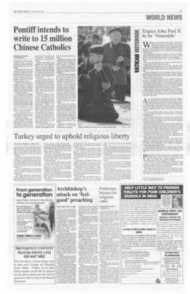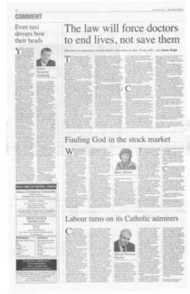Page 2, 26th January 2007
Page 2

Report an error
Noticed an error on this page?If you've noticed an error in this article please click here to report it.
Tags
Share
Related articles
Archbishop Urges New Fight On Adoption Law
News Review
Europeans To Blame For Rise Of Islam, Says Cardinal
Ward Will Be Back In Charge By Christmas
Rome Suspends Ecumenical Dialogue After Consecration Of...
`Fight trafficking with zeal of Wilberforce', urges archbishop
BY SIMON CALDWELL AND MARK GREAVES
A SENIOR Vatican diplomat has called upon Catholics to fight modern-day slavery with the same zeal as the early abolitionists.
Archbishop Michael Fitzgerald, the papal nuncio to Egypt and the Arab League, said that Christians had always been "at the fore" in the battle against slavery.
But he said new forms of human trafficking demanded extra effort to protect people from exploitation and to pursue those who sought to profit from it. "Christians have a special reason for fighting against slavery in all its forms, for it is a fundamental offence against human dignity." the Walsall-born archbishop said.
"This dignity has its roots in the nature of the human person, created in the image and likeness of God," he added. "From this perspective all human beings are equal, and none can be made the chattel of another."
The archbishop's remarks came during the Wilberforce Lecture he delivered in Hull last week to mark the 200th anniversary of the British abolition of the slave trade, the first step in abolishing the practice of slavery in Europe and the Americas.
Archbishop Fitzgerald told his audience that slavery still existed in its "classical form" in such places as northern Nigeria, Sudan and Mauritania.
But he said it had reemerged in developed countries in the form of trafficking which, he said, was "simply financial gain through exploitation".
"This exploitation may take the form of slavery or similar practices where labour is exacted for no reward. It may be prostitution or sex tourism or pornography. Mother form of financial gain is forced labour," he explained, adding that there was some evidence that people had also been trafficked for sale of their organs.
It is estimated that between 700,000 and two million people each year become victims of human trafficking.
Archbishop Fitzgerald argued that prevention entailed reducing the demand for services which the trafficking of persons provided. "This means reducing the demand for cheap goods manufactured in sweatshops or produced by bonded labour," he said. "To achieve this public opinion has to be alerted."
He continued: "There is also the need to reduce the demand for sexual services, since many of the victims of human trafficking end up in the sex trade.
"What is required here is surely good sexual education for youth, especially on the true meaning of sexual relations and the importance of the stability that marriage gives, rather than merely passing on information about safe sex . Another aspect of preven
tion is to render trafficking more difficult by making it harder to falsify travel and identity documents."
Better laws, he said, were also needed to protect victims of human trafficking once they had been identified.
Archbishop Fitzgerald, former president of the now defunct Pontifical Council for Inter-religious Dialogue, explained that he was inspired by the work of White Fathers founder Cardinal Charles Lavigerie, a campaigner against slavery who travelled "to different cities of Europe to arouse public opinion" and who even supported armed expeditions against slave traders. "When Cardinal Lavigerie was actively campaigning against slavery he felt the need for coordinated action. There is no less a need for coordinated action in combating modern forms of slavery."
Earlier this week Tony Blair agreed to sign a European convention against human trafficking after pressure from both Catholic bishops and the Conservative Party.
On Monday Bishop Patrick O'Donoghue of Lancaster and Bishop Christopher Budd of Plymouth said they welcomed Tory support for a convention that would allow victims of trafficking to stay in Britain for 30 days after they had been rescued.
According to the bishops, the Conservative Party's change of policy underlined the fact that protecting and providing reparations for victims was "the heart of the problem".
"Many of the victims are women and children, often the poorest and most vulnerable members of the human family," the bishops wrote in a joint statement. They insisted that signing the convention and working together with the rest of Europe would strengthen efforts to combat trafficking.
The convention, which has been signed by 34 European countries so far, would guarantee a 30-day recovery period for women and children rescued from forced labour or forced prostitution. It would also provide safe housing, emergency medical support and temporary residence permits for people who would be in danger in their own country or who might be able to help the police.
Sister Ann Teresa, who is leading efforts to set up a network of safe houses for trafficked women in Britain, said that signing the convention was an "important step", but explained that only until the convention was ratified would the Government be bound to implement it.
"The convention sees the victims of trafficking not just as illegal immigrants but as victims of crime and takes responsibility for providing all the help that people need to begin to recover from the trauma," she said.
blog comments powered by Disqus

















